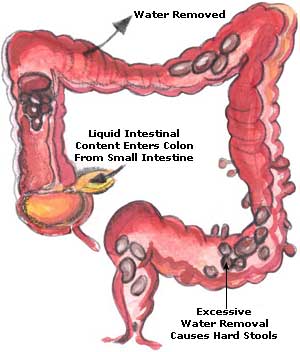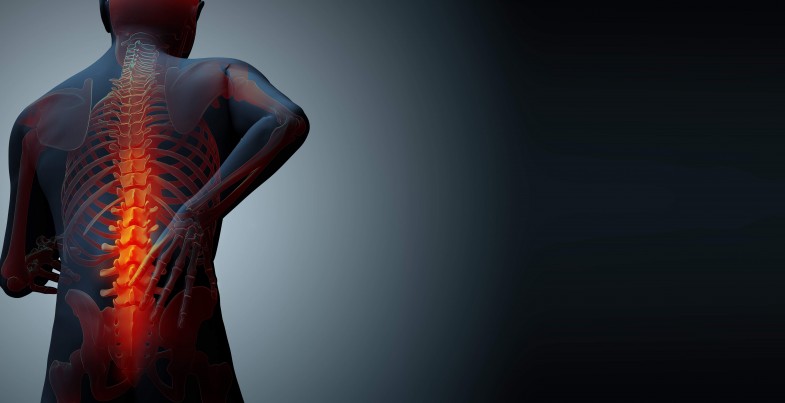
Constipation refers to the condition where bowel movements are irregular and the process of passing stools can be painful. Most people suffer from constipation at some point of time but some may complain of more frequent bouts than others. For most people constipation is a discomfort that’s best not discussed as it is in most cases temporary and for most people it’s an awkward subject. If the problem is severe or frequent and causes you a great deal of discomfort however it is important that you discuss it with your health care provider. In most cases dietary and lifestyle modifications alone suffice and there is no real need for medical treatment.
Our perceptions of constipation can also vary as this depends on what one views as regular bowel movements. While some individuals need to pass a stool at least twice or thrice a day, for some others regular bowel movements may simply include passing a stool once in two or three days. In most cases however an individual is said to suffer from constipation if there is straining to pass stools most of the time, if stools are hard most of the time, if the bowels are not completely evacuated a lot of the time and if bowel movements occur just once or twice a week.

For chronic cases, where the problem of constipation frequently recurs or is long lasting, a more aggressive form of treatment may be necessary. Infants, children and adults can all suffer from constipation due to a variety of reasons.
Symptoms of Constipation
Other symptoms of constipation may include:
- Irregular or less frequent bowel movements or anything less than thrice a week (severe constipation refers to only one or less bowel movements per week)
- Sudden change in regularity
- Harder stools that are more difficult to pass
- A bloated feeling in the lower abdomen
- Straining while passing stools
- Coated tongue
- Bad breath
- Depression and anxiety
- Headaches
- Insomnia
- Loss of appetite
- Dark circles under the eyes
- Mouth ulcers
- Dizziness
- Nausea
- Feeling of fullness in the abdomen
- Gas and bloating
- Varicose veins
- Heartburn
- Children who suffer from constipation may be easily fatigued and have no appetite
- Infants tend to be uneasy and fussy and suffer from gas and bloating
Causes of Constipation
Constipation occurs because of the slow passage of digesting food through the intestines. While this could occur in any part of the intestine in almost all cases this occurs in the colon. In almost all cases the main cause of constipation is a poor diet or dehydration, but it may also be caused due to certain medications. In some cases, constipation may also be a symptom of an underlying medical condition such as IBS or Irritable Bowel Syndrome.
The main causes of constipation include:
- A low-fiber diet
- Inadequate or poor intake of fluids
- Lack of regular exercise and a sedentary lifestyle
- Changes to lifestyle and daily routine, including meal timings or the timings for your bowel movements
- Delaying having a bowel movement even after the urge occurs (this is usually common among children especially toddlers who aren’t ready to be toilet trained)
- Discomfort such as inadequate privacy whilst using the toilet
- Abuse of laxatives
- Stress
- Depression
- Aging
- Obesity or overweight
- Metabolic disorders
- Medications such as certain anticonvulsants, antacids, antidepressants and antihistamines
- Travel and changes of schedule
- Pregnancy
- Hormonal imbalance
- Medical conditions such as cystic fibrosis or hyperthyroidism
- Diseases of the bowel such as IBS
- Abnormalities of the pelvic floor
- Colon cancer (though this is rare)
- Psychological problems such as trauma or shock resulting from violence, sexual abuse or personal loss
Remedies for Constipation
If the problem of constipation is acute or chronic, it is best to consult with your doctor to determine the underlying cause. You may need to undergo a series of blood tests, stool tests and abdominal x-rays to rule out various factors that may be causing the constipation. In severe cases, a barium enema or a colonoscopy may be required as well.
Mild cases of constipation can be treated with over-the-counter stool softeners and laxatives. However, these drugs should not be used for long periods of time or to treat chronic cases of constipation. To tackle severe constipation you need a combination of dietary and lifestyle changes to really make an impact on your bowel movements. If you prefer herbal or natural remedies for constipation, make sure you check with your doctor before trying anything new. Also keep in mind, an overuse of herbal supplements can reduce their efficacy in the long run.
Some laxatives may interact with certain medications so always check with your doctor if you are already on medications for any other health condition. For milder cases of constipation bulk forming laxatives that contain fiber are recommended. These soften the stool and make it easier to pass. Fiber supplements such as Metamucil can help, but make sure you drink enough water when taking such supplements or it could worsen the situation. The other types of laxatives are stimulant laxatives. These cause the muscles of the intestine to contract and encourage a bowel movement. However, these types of laxatives are not suitable for long-term use and can result in an electrolyte imbalance in the body and dehydration. If the constipation has been caused by an illness or as a side effect of surgery, stool softeners are usually prescribed to help make the bowel movement less painful. Saline or mineral oil enemas are more aggressive cures for constipation and should not be used on a regular basis. Home remedies for constipation in toddlers and children generally involve the use of suppositories. Glycerin suppositories are inserted into the rectum and soften stools and make them easier to pass.
You can also provide constipation relief with a number of simple natural cures or home remedies. Popular constipation remedies for adults include:
- Herbs such as flaxseed, fenugreek or barley work as bulk forming laxatives and are excellent chronic constipation cures. They contain soluble fiber that helps soften stools and reduces discomfort during bowel movements. Studies have supported some of these claims and defatted flaxseed meal was found to help in the treatment of constipation.
- Senna is another herb that functions as a natural stimulant laxative. It causes the walls of the intestines to contract and encourages a bowel movement. Senna should not be used for long periods of time and as with any herbal treatment should be taken under the supervision of a trained specialist.
- Aloe vera juice is a popular home treatment for constipation. Dilute aloe vera juice in water and drink first thing in the morning and last thing at night for regular bowel movements. Some people may experience cramping or diarrhea with aloe vera juice so proceed with caution.
- Pears and pear juice if consumed at breakfast and dinner time can help relieve constipation symptoms. If the constipation is severe, a fruit only diet for a few days will go a long ways towards clearing up the condition.
- Guava eaten raw with the seeds provides enough roughage to relieve constipation and soften stools naturally. For the best results eat one or two whole guavas every day.
- Grapes contain organic acid and cellulose that makes them a natural laxative. Grape juice can help tone the internal muscles of the stomach and prevent chronic constipation. If fresh grapes are unavailable, raisins soaked overnight in water are the next best alternative.
- Oranges stimulate the bowels and encourage regular bowel movements. Oranges also help prevent the accumulation of waste matter in the colon and reduces the chances of constipation.
- Dried or fresh figs, prunes and prune juice and fresh papaya are other fruits that are used to treat constipation.
- Raw spinach helps cleanse the digestive tract and cures constipation. Drink raw spinach juice mixed with water twice a day for the most effective treatment.
- You could also drink a glass of hot water with half a teaspoon of salt and the juice of half a lime added to it. Do this as soon as you wake up before consuming any other food or beverages. This is believed to help regularize bowel movements.
Diet for Constipation
An ideal diet to cure constipation and prevent its recurrence is one that is high in fresh fruits and vegetable, especially those with high fiber content. Dried fruits, whole grains, cereals, and vegetables are the best ways to get fiber into your diet. For the best results, you must increase your intake of water as well. Keep hydrated at all times to prevent the hardening of stools and encourage regularity. For some people, suddenly adding high amounts of fiber into their diet may cause gas and bloating. If this is the case, try introducing small amounts of fiber at a time until the digestive system gets used to it.
Suggestions for Constipation
The best way to treat constipation is to try and prevent it. To avoid constipation you must:
- Include lots of fiber into your diet
- Drink plenty of water daily but avoid too much caffeine and alcohol
- Start a regular exercise routine
- Do not delay a bowel movements if the urge occurs
- Chew food slowly and well when eating
- Do not eat on the go or at irregular times
- Avoid foods that are high in fats and refined sugar
- Avoid over processed and junk food
- If you are pregnant and suffer from constipation stay away from laxatives and over-the-counter medications as these can cause premature contractions. Opt for natural remedies and dietary changes to prevent constipation instead.
- Yoga can help regularize bowel movements. Certain yoga poses and asanas stimulate the digestive tract and encourage bowel movements. Deep breathing exercises and meditation also help relieve stress and anxiety that may be causing the constipation.













